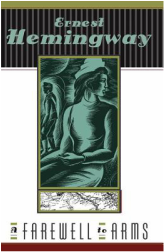
The first stop on my new odyssey through the classics was Ernest Hemingway's A Farewell to Arms. I taught this novel one semester, some five or six years ago, and I remember my class finding it a little dry--those who even bothered to read it. And I can see why, at times. Hemingway's direct style can almost make the dialogue unintentionally comical.
I think reading it again, I appreciate more Hemingway's exploration of the traditional wartime abstractions: courage, honor, glory. They essentially become meaningless as modern war becomes mechanized and large guns destroy courageous and cowardly in equal parts. Traditional values and expectations seem to be turned on their heads. Even something as simple as the concept of home takes on fractured meaning, as there are no real homes to speak of. Frederic and Catherine make homes for themselves in the hospital bed in Milan, in the cabin in Montreaux, but those are ultimately vulnerable, not real homes.
The other big idea that strikes me this time through is Frederic's loss of identity. He's constantly being mistaken for someone else. His friend Rinaldi believes he's done something courageous when he is wounded, despite Frederic's protests. The barber in the Milan hospital mistakes him for an Austrian officer. During the retreat, he's assumed to be a German infiltrator who is impersonating an Italian lieutenant. When he finally does desert and returns to Catherine in civilian clothes, he's uncomfortable without his uniform. And then when he and Catherine escape Italy into Switzerland, they live under false identities, as cousins. Even something as simple as the beard he grows in Switzerland makes him unrecognizable to himself in the mirror. And finally, when Catherine dies giving birth to their stillborn son, Frederic is dressed in a doctor's smock--another fake identity. By the end of the novel, it seems as if he's completely identity-less, having lost everything that he was.
A Farewell to Arms is different in character from some of the other Hemingway works I've read in that Frederic isn't one of his heroic, mentor-like figures. Unlike Santiago in The Old Man and the Sea, Frederic isn't a teacher/mentor figure who lives by a strong code of values. Frederic seems almost at the whim of fate and life happens to him more than he acts on life. Ultimately, it's a dark and dismal portrait of reality.
I think reading it again, I appreciate more Hemingway's exploration of the traditional wartime abstractions: courage, honor, glory. They essentially become meaningless as modern war becomes mechanized and large guns destroy courageous and cowardly in equal parts. Traditional values and expectations seem to be turned on their heads. Even something as simple as the concept of home takes on fractured meaning, as there are no real homes to speak of. Frederic and Catherine make homes for themselves in the hospital bed in Milan, in the cabin in Montreaux, but those are ultimately vulnerable, not real homes.
The other big idea that strikes me this time through is Frederic's loss of identity. He's constantly being mistaken for someone else. His friend Rinaldi believes he's done something courageous when he is wounded, despite Frederic's protests. The barber in the Milan hospital mistakes him for an Austrian officer. During the retreat, he's assumed to be a German infiltrator who is impersonating an Italian lieutenant. When he finally does desert and returns to Catherine in civilian clothes, he's uncomfortable without his uniform. And then when he and Catherine escape Italy into Switzerland, they live under false identities, as cousins. Even something as simple as the beard he grows in Switzerland makes him unrecognizable to himself in the mirror. And finally, when Catherine dies giving birth to their stillborn son, Frederic is dressed in a doctor's smock--another fake identity. By the end of the novel, it seems as if he's completely identity-less, having lost everything that he was.
A Farewell to Arms is different in character from some of the other Hemingway works I've read in that Frederic isn't one of his heroic, mentor-like figures. Unlike Santiago in The Old Man and the Sea, Frederic isn't a teacher/mentor figure who lives by a strong code of values. Frederic seems almost at the whim of fate and life happens to him more than he acts on life. Ultimately, it's a dark and dismal portrait of reality.
 RSS Feed
RSS Feed
